Filter by

Corporate ethics for turbulent markets: the market context of executive decis…
Corporate executives immersed in the turbulent markets of today face a world not of clear cut moral dilemmas such as right or wrong, or good or evil, but instead must confront large corporate grey areas of lesser good, lesser evil, less true, less unfair, and less unjust. Often these choices become almost indistinguishable. Corporate Ethics for Turbulent Markets: Executive Response to Market Ch…
- Edition
- First edition.
- ISBN/ISSN
- 9781787561915
- Collation
- viii, 320 pages ; 24 cm
- Series Title
- Corporate ethics for turbulent markets
- Call Number
- 174.4 MAS c
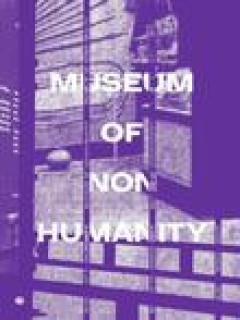
Museum of nonhumanity
Museum of Nonhumanity is the catalogue for a full-size touring museum that presents the history of the distinction between humans and animals, and the way that this artificial boundary has been used to oppress human and nonhuman beings over long historical periods. Throughout history, declaring a group to be nonhuman or subhuman has been an effective tool for justifying slavery, oppression, med…
- Edition
- 1st edition.
- ISBN/ISSN
- 9781950192120
- Collation
- 281p.:
- Series Title
- -
- Call Number
- B105.A55 GUS m
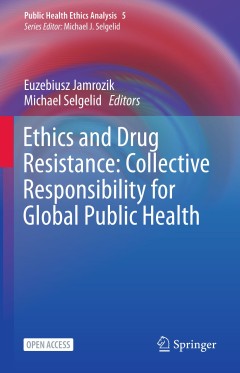
Ethics and drug resistance: collective responsibility for global public health
This Open Access volume provides in-depth analysis of the wide range of ethical issues associated with drug-resistant infectious diseases. Antimicrobial resistance (AMR) is widely recognized to be one of the greatest threats to global public health in coming decades; and it has thus become a major topic of discussion among leading bioethicists and scholars from related disciplines including eco…
- Edition
- -
- ISBN/ISSN
- 9783030278748
- Collation
- xvii, 448p. : ill.
- Series Title
- -
- Call Number
- 171.7 ETH e
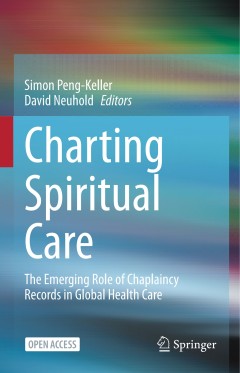
Charting spiritual care : the emerging role of chaplaincy records in global h…
This open access volume is the first academic book on the controversial issue of including spiritual care in integrated electronic medical records (EMR). Based on an international study group comprising researchers from Europe (The Netherlands, Belgium and Switzerland), the United States, Canada, and Australia, this edited collection provides an overview of different charting practices and expe…
- Edition
- -
- ISBN/ISSN
- 9783030470708
- Collation
- xv, 232p. : ill.
- Series Title
- -
- Call Number
- 259.4 CHA c
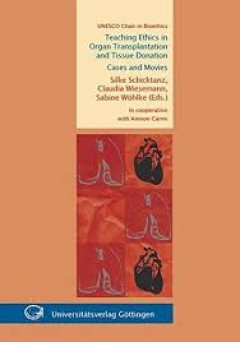
Teaching ethics in organ transplantation and tissue donation - cases and movies
Organ transplantation is a thrilling new option for modern surgery giving hope for chronically ill patients, and, at the same time, stirring controversial ethical questions on human identity and the meaning of the human body. Being a global and transnational endeavor, organ transplantation raises universal ethical concerns and, yet, has to be adapted to culturally mediated believes. In this boo…
- Edition
- -
- ISBN/ISSN
- 9783941875401
- Collation
- 88p.
- Series Title
- -
- Call Number
- 174. 297954 TEA t
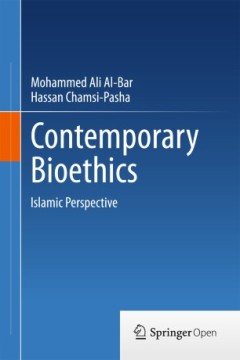
Contemporary bioethics : Islamic perspective
This book discusses the common principles of morality and ethics derived from divinely endowed intuitive reason through the creation of al-fitr' a (nature) and human intellect (al-‘aql). Biomedical topics are presented and ethical issues related to topics such as genetic testing, assisted reproduction and organ transplantation are discussed. Whereas these natural sources are God’s specia…
- Edition
- -
- ISBN/ISSN
- 9783319184289
- Collation
- xv, 267p. : ill.
- Series Title
- -
- Call Number
- 297.542 AL c
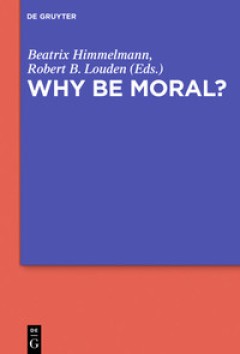
Why be moral?
What reasons do we have to be moral, and are these reasons more compelling than the reasons we have to pursue non-moral projects? Ever since the Sophists first raised this question, it has been a focal point of debate. Why be Moral? is a collection of new essays on this fundamental philosophical problem, written by an international team of leading scholars in the field.
- Edition
- -
- ISBN/ISSN
- 9783110366396
- Collation
- VIII, 278 p.
- Series Title
- -
- Call Number
- 170 WHY w
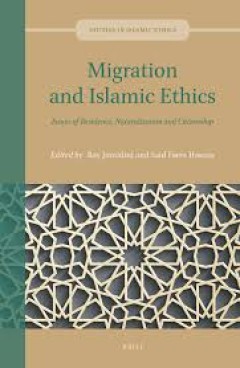
Migration and Islamic ethics: issues of residence, naturalization and citizen…
Migration and Islamic Ethics, Issues of Residence, Naturalization and Citizenship contains various cases of migration movements in the Muslim world from ethical and legal perspectives to argue that Muslim migration experiences can offer a new paradigm of how the religious and the moral can play a significant role in addressing forced migration and displacement Readership: All interested in migr…
- Edition
- -
- ISBN/ISSN
- 9789004417342
- Collation
- 1 online resource
- Series Title
- Studies in Islamic ethics, vol. 2
- Call Number
- 297.7 JUR m
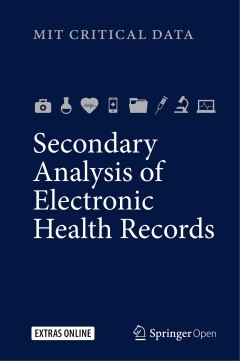
Secondary analysis of electronic health records
This book trains the next generation of scientists representing different disciplines to leverage the data generated during routine patient care. It formulates a more complete lexicon of evidence-based recommendations and support shared, ethical decision making by doctors with their patients. Diagnostic and therapeutic technologies continue to evolve rapidly, and both individual practitione…
- Edition
- -
- ISBN/ISSN
- 9783319437422
- Collation
- xxi, 427p. : ill.
- Series Title
- -
- Call Number
- 610.285 MAS s
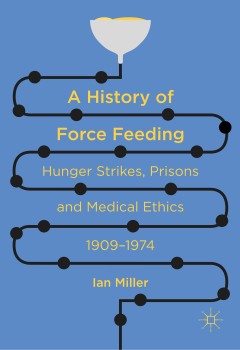
A history of force feeding : hunger strikes, prisons and medical ethics, 1909…
This book is the first monograph-length study of the force-feeding of hunger strikers in English, Irish and Northern Irish prisons. It examines ethical debates that arose throughout the twentieth century when governments authorised the force-feeding of imprisoned suffragettes, Irish republicans and convict prisoners. It also explores the fraught role of prison doctors called upon to perform the…
- Edition
- -
- ISBN/ISSN
- 9783319311135
- Collation
- ix, 267p. : ill.
- Series Title
- -
- Call Number
- 306.09 MIL h
 Computer Science, Information & General Works
Computer Science, Information & General Works  Philosophy & Psychology
Philosophy & Psychology  Religion
Religion  Social Sciences
Social Sciences  Language
Language  Pure Science
Pure Science  Applied Sciences
Applied Sciences  Art & Recreation
Art & Recreation  Literature
Literature  History & Geography
History & Geography